
• Introduction
Welcome to the most detailed article on the internet on how to start a medical residency in Germany and get a permanent German medical license. In German, the word for the permanent medical license is called 🇩🇪 Approbation. A temporary medical license is called in German 🇩🇪 Berufserlaubnis (BE). To be able to start working as a medical doctor and start a medical residency in Germany, you need to have one of these licenses (Article: Differences between the two in detail).
• A German recruiting expert can help doctors with Approbation get a job for free. Click JETZT: here.
• If you have any doubts or need more clarification, feel free to ask any time in the main group of Facharzt JETZT on Facebook and Telegram (all Telegram groups will be added as a folder).
• This article is a guide to enhance your understanding of the topic; however, it should not be your sole resource. Always consult official websites for the most accurate and up-to-date information (you can read our full disclaimer here).
• General notes
▪ The exams required from International Medical Graduates (IMG) do not depend on their nationality (e.g., if they are EU or not EU) but depend on in which country they studied medicine (more explained in step number 9).
▪ The steps should not always be followed in the same chronological order to start a medical residency in Germany.
Examples
For example:
– You can start learning German (step 2) before finishing medical school (step 1).
– In some German states, to apply for a medical license (step 6), you must apply for a job (step 10) and get a job offer first.
– In some German states (like North Rhine-Westphalia), you can apply for Approbation (step 6) before getting a B2 certificate (step 2).
▪ This article was written with the help of Mr. Teddy Kabel, the administrator of the second-largest English group for foreign doctors in Germany. Vielen Dank.
• The ten steps to start a medical residency in Germany:

1. Finish medical school
Logically, to start medical residency in Germany, you need to have received your medical degree. In most countries of the world, medical school lasts six years. In a few countries, like Germany itself or China, medical school lasts five years. The duration of medical school does not play a role in Germany.
• Does the university average play a role in getting a medical license or a job in Germany? No or very low effect…
• To get the medical license: zero role!
• To get a job: The two most important things are:
1. Approbation
2. Speaking excellent German.
See what is also important in this detailed article about improving your CV.
• For those who failed a year or more in medical school…
If I failed a year or more in medical school and had to repeat them, would I still have a chance to get a German medical license and work in Germany?
Certainly yes! You need a recognized bachelor’s degree from a recognized university, regardless of how long you studied medicine. So, failing a year or more is not a problem.
– Are your university and faculty recognized in Germany?
Use “Anabin” website to see if your university and medical degree are recognized in Germany. If your university and faculty have the status “H+/+”, then they are recognized in Germany. This YouTube video shows you how to find this out using Anabin.
That being said, the Anabin website sometimes does not contain the names of universities recognized in Germany. So, if you did not find the name of your university, this is probably not the end of the world.
• What should I do if my university AND faculty were not listed on the Anabin website?
You can, in this case, do the following:
Ask in so many Facebook and Telegram groups if graduates from your medical faculty got recognized in Germany.
You can apply for a “statement of compatibility” on the Anabin website. Everything you need to do is explained on its page on Anabin website.
You can also email this German government organization: make-it-in-germany@arbeitsagentur.de. Please post about your experience in our main groups on Facebook and Telegram.
• Does the status of my university on the Anabin website show if I will get the Gleichwertigkeit (avoiding the medical knowledge exam – KP) (step 6)? No!
– Stop & think: Is a medical residency in Germany the best option in “your” case?
Before deciding to come to Germany and start medical residency, please read about the advantages and disadvantages of medical specialization in Germany and other countries. If you want to start on a specific pathway, you should only concentrate on it. Therefore, we wrote many articles to help you decide: “Thinking about coming to Germany?”
An important point in helping you decide is knowing if your bachelor’s degree will be considered equivalent to a German one (🇩🇪 gleich/Gleichwertigkeit). This is critical because it will save you from doing the medical knowledge exam (step 9). We explained this in the following article:
By the way, if you find the above route complicated and particularly if you do not like to work with patients, there is an academic route:
🇩🇪 For physicians: Doing a Master’s or PhD degree in Germany
If you still cannot decide, read as much as possible about this specialization route. Look at our main Facebook group and Telegram group and see what doctors are discussing and what problems they are facing. You are welcome to post as many questions as you like.
↑ Back to the list of 10 steps
2. Learn the German language & improve your CV to start medical residency in Germany
– Learning German
During your internship year or even before that, start learning the German language until at least the B2 level. We recommend learning at least until the C1 level. Language is essential later on during interviews when working with patients and even during the board exams (die Facharztprüfung). Besides having a German Approbation, language proficiency is the most critical criterion for the selection process.
Should the language certificate be from a particular testing authority/institute? Yes…
Yes, for sure, certificates are accepted from Goethe-Institut and Telc. Both are good, but Goethe-Institut is more famous among the Germans. When you are in Germany, some might ask you: “How did you learn German in your home country, Goethe?”.
Some say, that certificates from ÖSD might be accepted, too. This is an Austrian exam provider.
Should I get an official certificate for each language level I finish, from A1 to B2? No…
Certainly No! To apply for the Approbation, only a B2 certificate is enough. To apply for the Visa, a B1 certificate is required at least.
Should I get the C2 level certificate? No…
I work in Germany since >9 years, have met hundreds of doctors, worked in 14 hospitals, and had through Facharzt JETZ contact with thourdands of doctors. Despite my experience and connections through Facharzt JETZT, I have never met a single doctor with a C2 German certificate 😅 While having it in your CV is advantageous, the language proficiency assessed in the exam tends to be more general and literal than what is typically used in the medical field. Therefore, there’s no need to stress about obtaining a C2 certificate. Aim for a C1 certification and ensure that you can speak fluently with the least noticeable accent possible. 😍 See too our article about improving your CV.
By the way, even psychiatrists are not expected to have a C2 certificate. At the end, it is not about certificates, it is about your understanding patients and speaking clearly and fluently.
The following are articles related to doctors learning German:
🇩🇪 How long does it take to learn the German language?
🇩🇪 Why is learning German easy and why it is hard
🇩🇪 Sources to learn German for foreign doctors going to Germany
🇩🇪 Enjoy learning German: Through songs
– Improving CV
Even before you arrive in Germany, enhance your chances of securing your dream medical specialty in a renowned German hospital by focusing on learning German and engaging in activities that bolster your CV. Discover valuable insights and guidance in another article on our website:
🇩🇪 Improve CV as a foreign doctor: Before and after coming to Germany
To quickly start a medical residency in Germany, do not forget to build connections. This is important because connections save you time, money, and stress. With Facharzt JETZT, it is now possible and for free to make connections with doctors working in Germany:
🇩🇪 Doctors wanting to work in Germany: How to make connections? Why? 🕵️
🇩🇪 How to make connections through our community “Facharzt JETZT”? Get a training or even a job! 🥳🥳😊💓
↑ Back to the list of 10 steps
3. Finish the internship year to start a medical residency in Germany (das Praktische Jahr)
You MUST finish an internship year to start a medical residency in Germany, where you studied medicine, or in your home country. However, graduates from the following countries are usually required to do the internship year in their countries of study:
Approbation for foreign medical graduates from China, Georgia, the Philippines, and Ukraine
The internship year should contain certain rotations with certain durations and should have certain characteristics. We explained all of that in the following article:
Did you finish your internship year, or can you finish it in the future?
| Yes 🥳 | No 😥 |
|---|---|
| Congrats 🙂 You are finished with step number 3. Please go to the next step (number 4) | To do it in a third country or Germany is complicated and should be avoided, not to mention that doing it in a third country would probably not be recognized. The full details are in the following article: “For medical doctors: Is the internship year (🇩🇪 das Praktische Jahr – PJ) a must to be able to work in Germany? 100% yes! No exceptions!“ |
↑ Back to the list of 10 steps
4. Get your (permanent) medical license
The following rule applies to graduates of most countries: You can get your medical license after finishing the internship year, either in your home country or where you studied medicine. This is a very important document. Without it, you cannot start a medical residency in Germany. Some say a temporary medical license from your home or study country is enough. But for sure, if you have a permanent medical license, you are on the right path and can move to step number 5.
Like the internship year (step 3), this rule has a few exceptions. Graduates from the following countries need mostly to have a medical license from their country of study:
Approbation for foreign medical graduates from China, Georgia, the Philippines, and Ukraine
↑ Back to the list of 10 steps
5. Prepare your documents for applying for the German permanent medical license (die Approbation)

To ensure getting a medical residency in Germany, you can start during the internship year to slowly collect all the needed documents for applying for the German permanent medical license (🇩🇪 die Approbation). Be careful; do not prepare your documents too early because some documents are allowed to be maximally one to six months old at the time of application for the Approbation (For example, the police clearance certificate – 🇩🇪 die Straffreiheitsbescheinigung). A complete list of the needed documents is in the following link:
– Find which documents you need exactly
The documents differ slightly between the 16 medical license authorities in the 16 German states. You can find the documents that are needed on the websites of the 16 medical license authorities. On the website of each medical license authority, the required documents and application files are listed depending on where you studied medicine, either in the European Union/European Economic Area (EU/EFTA) or outside of it. Here we collected the links for you: Direct links.
The authorities do not provide many explanations about the documents, and there are many pitfalls. Therefore, please read our article about the required documents first.
– The translation of the documents
Wrongly translated documents could destroy your chances of working in Germany or make it a nightmare. Therefore, we wrote a whole article to explain the translation of documents for you:
🇩🇪 Translation of documents: Where and what to pay attention to
– The authentication
We recommend legalizing your documents in the countries you got them from (country of origin or where you studied medicine). However, the German embassies do not legalize documents in a few countries. We explained all of this here:
🇩🇪 What is authentication (die Beglaubigung) & where to do it
6. Send via mail your application for the German permanent medical license (die Approbation)
After you finish the internship year, you can mail your application to one of Germany’s 16 medical license authorities (list of them). Unlike the USA, Canada, or England, there is no centralized authority for that.
Applications per E-Mail are NOT accepted.
– To start medical residency in Germany: Proof of intention
To be able to apply for a German Approbation, you need in 14 out of 16 medical license authorities a “proof of intention”. We explained this and how to get it in the following article:
The two German states which do not require proof of intention are Bavaria (🇩🇪 Bayern) and Thuringia (🇩🇪 Thüringen). In Berlin, it is enough to provide email copies of answers from hospitals that refused your application for a Hospitation (medical training) (Articles: What is a Hospitation & How to apply).
– For non-EU/EFTA doctors: Decide whether you want to apply for the Gleichwertigkeit
All foreign doctors must take the Fachsprachenprüfung (FSP) (medical language exam) (step 8).
The Kenntnisprüfung (medical knowledge exam) (step 9) is NOT required from graduates of universities in the European Union (EU)/European Free Trade Association. Graduates from universities in the rest of the world should decide at the time of the approbation application if they want to register for the Kenntnisprüfung exam or if they want to undergo the process of the Gleichwertigkeit. We explained this in step number 8.
More questions and answers about step six of the 10 steps to start a medical residency in Germany:
The ECFMG: Applying for a medical license in the USA
In the USA, the ECFMG is responsible for testing all medical doctors who want to apply for a medical license in the USA. The USMLE exams. if you ever heard of them, are conducted by the ECFMG.
Source: Wikipedia.
What are the 16 German medical license authorities (🇩🇪 die Approbationsbehörden)?
In which one of the 16 medical license authorities should you apply for the Approbation?
The decision should consider many factors, such as how hard the exams in the German state are and how easy it is to get a job with Berufserlaubnis (BE). Still, the most important factor is getting the Gleichwertigkeit in that state. So, please ask firstly medical graduates from your university where you should apply for the Approbation (you can also ask in our main group on Facebook and Telegram). The following article can help you a lot in your decision:
🇩🇪 Where to apply for approbation: Advantages & disadvantages of each German state
Can the application be online?
No! Never! You need to send authenticated copies of your documents by post (Article: “What is authentication?”)
Can I apply simultaneously to many authorities?
Never! Do not do that!, It is not allowed, and they will discover it sooner or later.
Can I apply for Approbation in one German state and work in another?
Once you get your German Approbation, you can work overall in Germany from day one. On the other hand, with a temporary medical license (Berufserlaubnis), you can work only in one German state. More details are in the comparison article between the Approbation and the Berufserlaubnis (link).
Can you change your mind and move your application for the Approbation from one German state to another?
Yes, but this takes at least 2 to 3 months. We explained here how you can move your application for the approbation from one German state to another:
Do the months/years of residency I spend working with Berufserlaubnis (temporary medical license) count for the residency period?
In the great majority of states, no. A comparison article about the difference between the Approbation and the Berufserlaubni: Link.
↑ Back to the list of 10 steps
7. Apply for a visa (if you need one) & travel to start medical residency in Germany
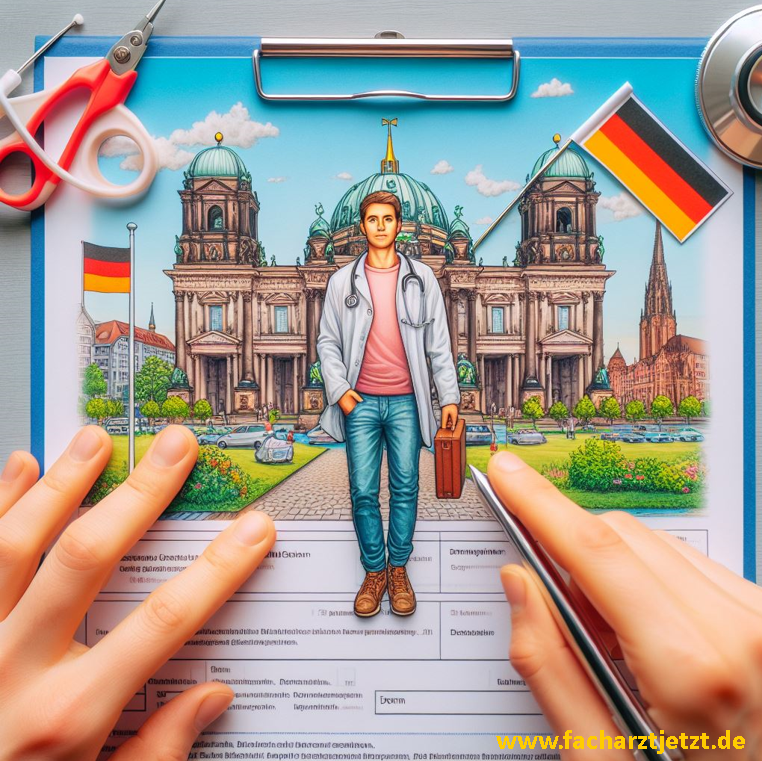
To travel to Germany, citizens of many countries must apply for a German visa. You should give the German embassy a reason for coming to Germany. We explained the reasons and other issues related to this topic in separate articles:
🇩🇪 Applying for a German visa: How? Reasons for coming to Germany?
• There are in 2024 new changes coming to the visa laws, making it easier to come & work in Germany and get the German nationality. This is thoroughly explained in the following article:
🇩🇪 The Skilled Immigration Law (Das Fachkräfteeinwanderungsgesetz)
To get a German visa, one of the things you need is “proof of financial resources”. We explained the two methods for that in this article:
8. Do the medical language exam (die Fachsprachenprüfung – FSP)
This exam is required from all doctors who did not finish high school in Germany, even if they have a German passport. You can do it ONLY after you send your application to apply for the German permanent medical license (🇩🇪 die Approbation) (step number 6) and get a reply that you can do this exam. Again, as explained in step number 5, applying for a permanent medical license is only possible after finishing medical school.
• Detailed articles:
After passing the medical language exam, your steps will depend on the country where you studied medicine. We explain this in the following algorithm and table:
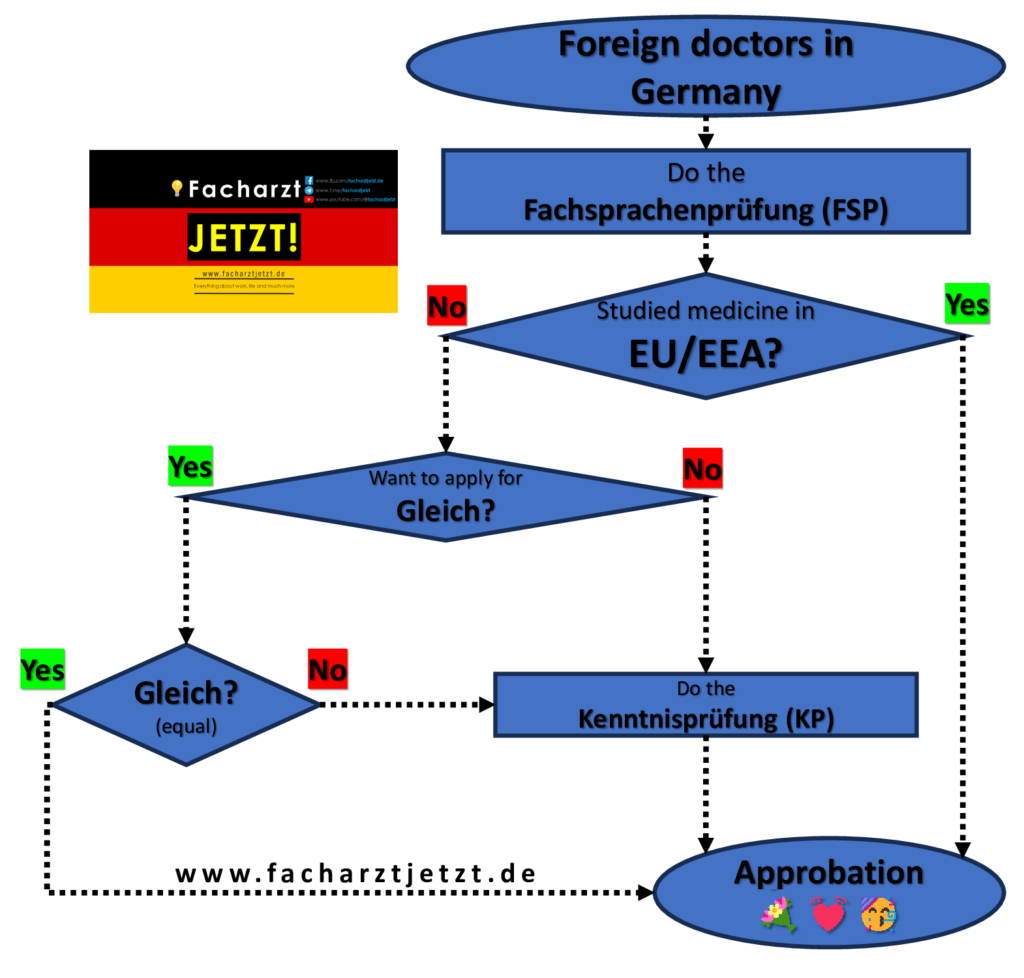
Did you study medicine in a country of the European Union (EU) or of the European Free Trade Association (EFTA)?
| Yes (EU/EFTA) 🇪🇺 🇮🇸 🇱🇮 🇳🇴 🇨🇭 | No (Rest of the world) 🌍 |
|---|---|
| Congratulations 🥳🥳💐💐 After passing the medical language exam, you will get the approbation. 🥳🥳 You do not need to read further in steps 8 or 9. Go straight to the last step (number 10). | Most graduates outside the EU/EFTA must take the medical knowledge exam (🇩🇪 die Kenntnisprüfung). Who should now take it is explained in yellow in the next questions. |
– All about the Gleichwertigkeit/gleich & should you apply for it
What is the 🇩🇪 Gleichwertigkeit/gleich?
The German word “gleich” is an adjective that means “equal or similar”. Gleichwertigkeit is the noun form of it.
In the context of non-EU/EEA doctors applying for the Approbation, it means that they apply for an evaluation (🇩🇪 Gleichwertigkeitsprüfung) of the subjects they studied in medical school (syllabus), of their work experience after the internship year, and the courses they attended. This evaluation process costs around 1000-1800 euros and takes four to 18 months (depending on state). After this waiting period, they get an answer if what was submitted is “gleich” or not. If they are gleich, they do not need to take the medical knowledge exam and are treated like EU/EEA graduates. 🥳 If they are judged to be not “gleich,” then they need to do the medical knowledge exam (Kenntnisprüfung). 😥
How do I know if the graduates of my “batch” from our university get the Gleichweritgikeit?
Only if you can find the ones who applied in Germany, and they told you about the answer they got. You can ask in our main group on Facebook and Telegram. More details in this article:
Should I apply for the Gleichwertigkeit?
It depends on the likelihood of your getting it.
| Highly likely | Little or no hope | |
|---|---|---|
| What should you decide? | We recommend trying to apply for the Gleichwertigkeit. | Request from the beginning of your approbation application (step 6) that you want to do the medical knowledge exam. |
| Disadvantages of the decision | • Costs for applying for the Gleichwertigkeit (around 1000-1800 euros) • The reply needs months. If you got the end “not gleich,” then you should wait for an appointment for the knowledge exam, like someone who sent his application for the approbation on the same day but was asked to do the knowledge exam directly. | You might miss getting a “gleich” if you applied. |
| Advantages of the decision | No knowledge exam if “gleich” | If you applied from the beginning to do the knowledge exam and did not apply for a gleich, then: 1) You can quickly register for an appointment to do the knowledge exam (appointment needs months) 2) You can start early preparing for the knowledge exam, which is mainly a clinical exam, and you are not wasting time learning for it (see step 9). |
If I applied for the Gleichwertigkeit, can I work until I receive an answer?
Yes. You can work with a 🇩🇪 Berufseralubnis (BE) (temporary medical license). Read this article for the details:
🇩🇪 Approbation vs Berufserlaubnis: Can I work as a doctor with Berufserlaubnis? Yes, but…
Can you apply for the Approbation in one German state, do the Fachsprachenprüfung (FSP) there, and then do the medical knowledge exam (Kenntnisprüfung) (KP) in another German state?
Yes! This is how to move your application: Article.
Doing the FSP in one state and then the KP in another is common in the German Northrhine-Westphalia (NRW). This is because the medical knowledge exam there (which takes place in the city of Münster) is the hardest in Germany. In NRW, the medical language exam (FSP) takes place in Düsseldorf and Münster. In Münster, the FSP is also the hardest in Germany. In Düsseldorf, it is normal. Therefore, after succeeding in the FSP, some doctors move their applications to do the KP in another German state.
↑ Back to the list of 10 steps
9. When requested, do the medical knowledge exam (die Kenntnisprüfung – KP)
As we explained in step number 8, not all foreign doctors must do this exam. This is an oral medical exam. There is not a single MCQ question in it. 🥳 This means the exam is a friendly discussion, and the doctors need at least a general outline of diseases, medications, and therapies. We wrote a detailed article here: “What is the medical knowledge exam (die Kenntnisprüfung – KP)?“
Doctors who must do a medical knowledge exam are allowed by many medical license authorities to work for 6 to 24 months with a temporary medical license ( eine Berufserlaubnis). We explained the differences between a permanent and a temporary medical license in this article:
eine Berufserlaubnis). We explained the differences between a permanent and a temporary medical license in this article:
“🇩🇪 Approbation vs Berufserlaubnis: Can I work as a doctor with Berufserlaubnis? Yes, but…”
We hope that you can avoid doing a medical knowledge exam (🇩🇪 die Kenntnisprüfung) and that you now have a permanent German medical license (🇩🇪 die Approbation).
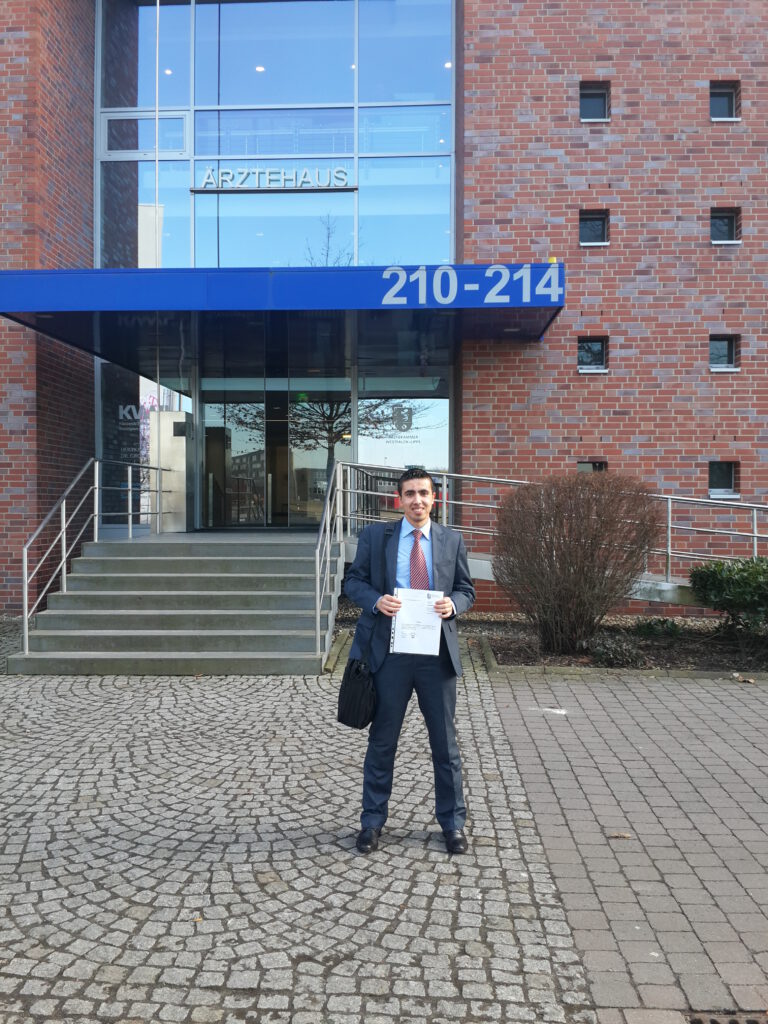
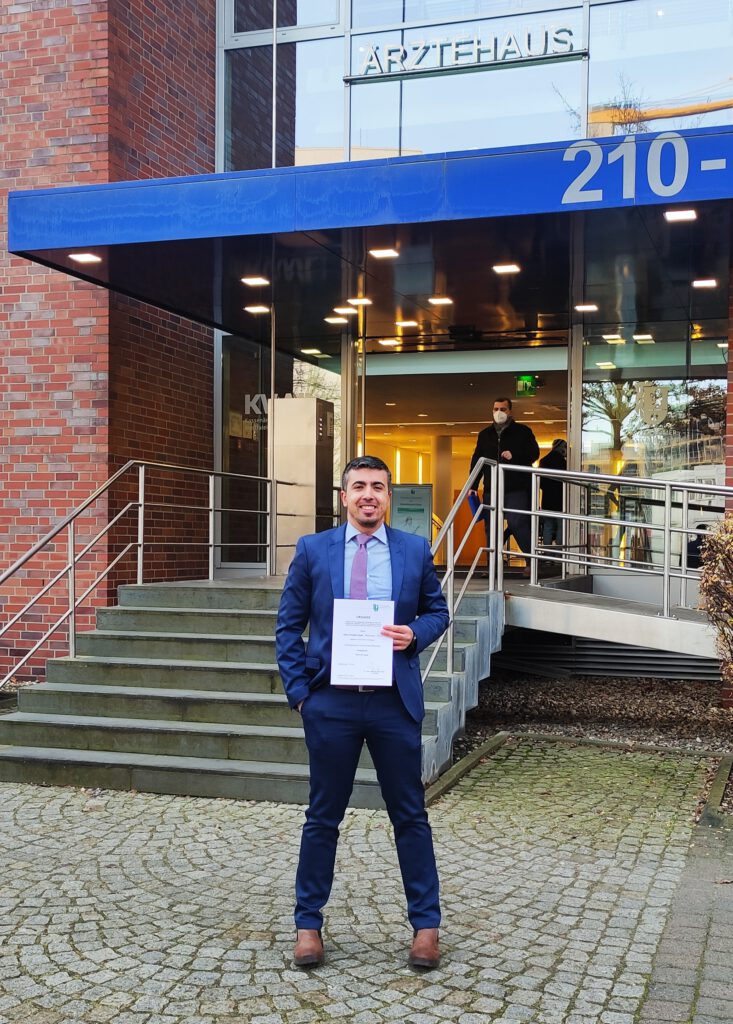
Do not forget to post your photo with the Approbation document in the main Facharzt JETZT group on Facebook and Telegram.😊🥳 This will motivate others, especially if you write small tips from your experience. That would be very nice of you. 😊💐
↑ Back to the list of 10 steps
10. Apply for a job (die Bewerbung um eine Stelle)
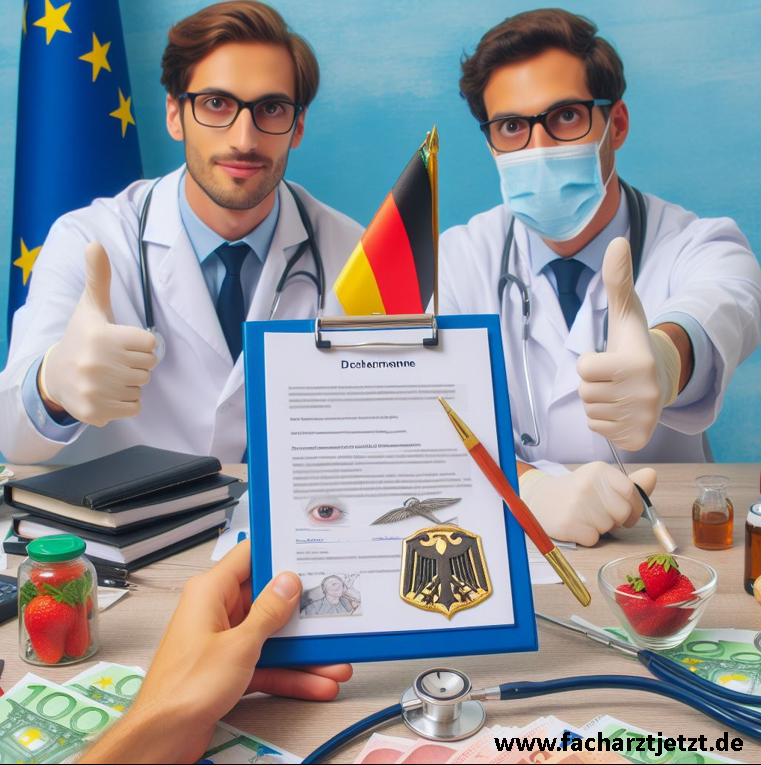
To save time, after passing the required exams from you and while waiting for the Approbation/Berufserlaubnis document, start applying for a job. Write in your job application that you passed the exam(s) and include a copy of the confirmation (you get this on the day of the exam). You can begin working immediately after getting the approbation certificate by mail.
• There is a German expert who can help doctors holding the Approbation find a job for free, because German hospitals pay him to find doctors for them — instead of them wasting money and time on expensive advertisements and interviews. In addition, he also offers a free evaluation of your CV. Apply now:
• We explained in the following articles how you can apply for a job (including free samples for your application email and your motivational letter):
🇩🇪 Doctors in Germany: Find job offers & apply intelligently
• In the following articles, we explained the job interviews and how you can fully succeed in them:
From A to Z: Job interview for doctors in Germany (das Vorstellungsgespräch)
After being accepted for the job, you need to do a few things. Some of them are optional, and some are mandatory. Please do not forget them because they could cause you to earn more or less money.
↑ Back to the list of 10 steps
• YouTube video: Same steps summarized
Watch the video on our YouTube channel: link.
At the end of this article, we assure you that if you carefully follow these 10 steps to start medical residency in Germany, we will guarantee you that you will get your German Approbation.
Herzlichen Glückwusnch (Congratulations)
You will get the job!
Want to learn more? Questions?
Join JETZT (🇺🇸 now) all of our groups & ask what you like
(On mobile phone: The links are at the end of this page/ On PC: On the right side)
Further readings:
• “Approbation in Germany”, Helena Mamić – Soprano website (Foreign doctor in Germany from Croatia), link.
• “Getting Started with Medical Residency in Germany”, German medical residency website, link.
• “Application Process for Medical Residency in Germany”, German medical residency website, link.
• “Preparation of documents for Berufserlaubnis / Approbation”, your second heart blog, link.
I’m a medical student in Africa level 4 general medecin , wheeling to specialise in Germany. Just want to know the differents steps involved.
Hi Akono 🙂 Steps involved in what please?
Registration for specialisation
To register for the specialisation
All the steps are mentioned above. If you mean, how to apply, then see step number 6.
is russian degree equivalent in germany
This depends on University. Please see step numeber 8.
This is extremely well made and put together 👍
I wonder if there’s one for dental residency programs
Thanks a lot 🙂 Unfortunately not, but same process. Join our group for dentists:
– Facebook: https://www.facebook.com/groups/arabdentistsingermany/
– Telegram: https://t.me/dentistsingermany
Reine Annie TEMDEU. Please my daugther is a médical student level 2 here in kamerun in Africa.I want her to practise in Germany After she would finish school.I just want to know how she will manage to enter Germany and to register for thé Approbation
The steps are all above 😊
If students from your university are given Gleich, should apply for it before fsp or after passing fsp?
Before. Read again the steps above. Or read here: https://facharztjetzt.de/gleichwertigkeit-avoiding-a-medical-knowledge-exam/
hello, is standortvermerk needed if i live in Germany, i live in a state but i want to apply to a different state.
each state has its own laws on what os required to accept an application for Approbation. You can find it in their websites. Search for the article here called: direct links Approbation authorities